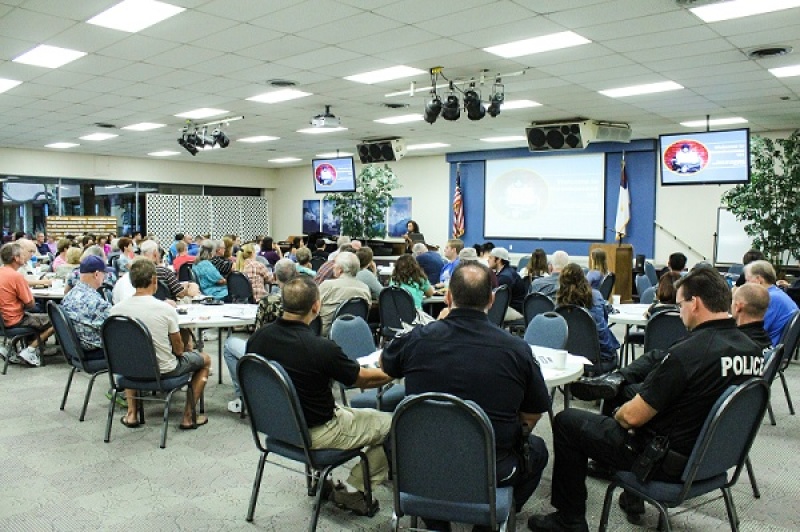

In a collaborative event, various groups joined together to inform the Fullerton community about the issue of homelessness in the Orange County community.
"Don't "should' on yourself." Thus was the ending of an educational seminar on homelessness this past Saturday. More than a quip, the phrase was a critique on the feeling of burden when helping others. "It's not what we should do, but what we get to do," said Jason Phillips, Chaplain for Fullerton Police Department and an organizer of the event.
Collaboration between the Fullerton police, local churches, non-profit organizations, and AmeriCorps Vista (the domestic version of the Peace Corps) brought together the Fullerton community to address the issue of the 4,000 individuals experiencing homelessness in Orange County, California. Some 130 attendees gathered at Evangelical Free Church to learn about the epidemic in the community, and how to exercise the privilege of loving their less fortunate neighbors in the Homelessness 101 seminar.

A diverse group of college students, parents, Christians, and seniors gathered on a Saturday morning to become more aware of the situation of homelessness in their community.
Michael Shepherd, member of Pathways of Hope, was the first of six speakers who detailed many misunderstandings of the community. "Homelessness means that there is no stable place to live, that's the only definition," said Shepherd. "Many of us are just a few paychecks away."
"It's not to do with behavior or steering in life, it's purely economic." He explained the problems of alcohol and drug abuse as cheaper alternatives to cope with the difficulties of homelessness. "There's trauma of losing one's identity as a contributing member of society," he said.
The goal, according to Shepherd, is to provide "permanent housing" for those experiencing homelessness.
Ariel Yarrish, representing Future in Humanity and Pathways of Hope, clarified the issue of mental health and homelessness. "There is lots of stigma associated with mental illness, but we shouldn't stereotype," she said. "Most importantly, do not be afraid of it."
Often times, the illnesses are "developed due to homelessness," Yarrish explained. "These individuals stop talking and relating to people and loved ones." Such conditions exacerbate the development of mental illnesses.
"They're not dangerous. It's just a lack of knowledge on our part," said Yarrish.
Afterwards, Philip Sturgeon gave a volunteer's perspective by sharing his testimony of his friend Joey who was experiencing homelessness. Joey was without a home for years but was reluctant to transition out of his lifestyle. Through years of steadfast friendship and meaningful conversations, Joey allowed Sturgeon to help him make a radical decision to change his life through a rehabilitation type program.
"They are people first. We need to let people know they are loved," Sturgeon said. He and a group of friends have been handing out coffee, donuts, and relationships to those experiencing homelessness every Monday morning at 7 A.M. for the past two years.
The seminar also stressed the pragmatic importance of safety when dealing with homelessness. Fullerton Police Department's Homeless Liaison Officer, Michael McCaskill, stressed the importance of never going alone. "Good people may make bad choices," he said.
Officer McCaskill urged those who were interested in helping, to partner with preexisting organizations to deal with homelessness, many of which were present at the seminar. He stressed to never give cash to those experiencing homelessness, and that oftentimes even compassionate outreach may lead to a reinforcement of negative tendencies. The best method of assisting is to do so through an established organization that can provide long-term solutions.
David Thompson and Philip Armstrong, members of AmeriCorps Vista, ended the official lecture portion of the seminar. Thompson briefly explained the reason behind the event. "Collective impact is the phrase we like to use," he said. The reason for the collaboration is to have a larger and more effective impact. Many organizations and churches were actively showing compassion to the homeless, but lacked communication; this lead to a squandering of resources through ineffective means.
Thompson further explained that individuals must secure their own mental and emotional stability before helping others. Without personal stability, or "self-care", one puts both parties in jeopardy.

A discussion panel answered various questions from the audience. (From left to right: Ariel Yarrish, Michael Shepherd, Officer Michael McCaskill, and Corporal John DeCaprio).
Following the presentations, a discussion panel consisting of Shepherd, Yarrish, McCaskill, and Police Corporal John DeCaprio answered questions from the audience.
The seminar ended with Jason Phillips challenging believers to join in and get "a front row seat to what God's doing." Phillips referenced the parable of the good Samaritan and encouraged attendees to love their homeless neighbors, especially through the resources offered by the organizations at the seminar.
"I was really impressed. The seminar was really informative and insightful," said Kelly, a member of an organization called Acts of Kindness that hands out meals to those experiencing homelessness every Friday.
Many attendees had interest in homelessness before the seminar. Jessica Eileen made sandwiches for those experiencing homelessness for her birthday the past few years. "Coming to this seminar, my eyes were opened. I learned about resources I could use. And I realized that maybe sandwiches aren't the best way to help the homeless, so I think for my upcoming birthday, I'll just make care packages instead of sandwiches," said Eileen.
"We want to convict the churches to what God is doing. We are very excited with the turnout. This is what we were praying for," said Phillips.



















